- Home
- Sharon Shinn
Reader and Raelynx
Reader and Raelynx Read online
READER AND RAELYNX
Other Ace Books by Sharon Shinn
MYSTIC AND RIDER
THE THIRTEENTH HOUSE
DARK MOON DEFENDER
READER AND RAELYNX
ARCHANGEL
JOVAH’S ANGEL
THE ALLELUIA FILES
ANGELICA
ANGEL-SEEKER
WRAPT IN CRYSTAL
THE SHAPE-CHANGER’S WIFE
HEART OF GOLD
SUMMERS AT CASTLE AUBURN
JENNA STARBORN
Viking/Firebird Books by Sharon Shinn
THE SAFE-KEEPER’S SECRET
THE TRUTH-TELLER’S TALE
THE DREAM-MAKER’S MAGIC
GENERAL WINSTON’S DAUGHTER
READER AND RAELYNX
SHARON SHINN
ACE BOOKS, NEW YORK
THE BERKLEY PUBLISHING GROUP
Published by the Penguin Group
Penguin Group (USA) Inc.
375 Hudson Street, New York, New York 10014, USA
Penguin Group (Canada), 90 Eglinton Avenue East, Suite 700, Toronto, Ontario M4P 2Y3, Canada (a division of Pearson Penguin Canada Inc.)
Penguin Books Ltd., 80 Strand, London WC2R 0RL, England
Penguin Group Ireland, 25 St. Stephen’s Green, Dublin 2, Ireland (a division of Penguin Books Ltd.) Penguin Group (Australia), 250 Camberwell Road, Camberwell, Victoria 3124, Australia (a division of Pearson Australia Group Pty. Ltd.)
Penguin Books India Pvt. Ltd., 11 Community Centre, Panchsheel Park, New Delhi—110 017, India Penguin Group (NZ), 67 Apollo Drive, Rosedale, North Shore 0632, New Zealand (a division of Pearson New Zealand Ltd.)
Penguin Books (South Africa) (Pty.) Ltd., 24 Sturdee Avenue, Rosebank, Johannesburg 2196,
South Africa
Penguin Books Ltd., Registered Offices: 80 Strand, London WC2R 0RL, England
This is an original publication of The Berkley Publishing Group.
This is a work of fiction. Names, characters, places, and incidents either are the product of the author’s imagination or are used fictitiously, and any resemblance to actual persons, living or dead, business establishments, events, or locales is entirely coincidental. The publisher does not have any control over and does not assume any responsibility for author or third-party websites or their content.
Copyright © 2007 by Sharon Shinn.
Map by Kathryn Tongay-Carr.
All rights reserved.
No part of this book may be reproduced, scanned, or distributed in any printed or electronic form without permission. Please do not participate in or encourage piracy of copyrighted materials in violation of the author’s rights. Purchase only authorized editions.
ACE and the “A” design are trademarks belonging to Penguin Group (USA) Inc.
Library of Congress Cataloging-in-Publication Data
Shinn, Sharon.
Reader and raelynx / Sharon Shinn—1st ed.
p. cm
ISBN: 1-4295-5620-x
1. Mystics—Fiction. I. Title.
PS3569.H499R43 2007
813'.54—dc22
For Kay Kenyon and Louise Marley,
with whom I have shared
the joys and terrors of writing a series—
terrific writers, faithful convention buddies,
and true friends.
GILLENGARIA
CONTENTS
CHAPTER 1
CHAPTER 2
CHAPTER 3
CHAPTER 4
CHAPTER 5
CHAPTER 6
CHAPTER 7
CHAPTER 8
CHAPTER 9
CHAPTER 10
CHAPTER 11
CHAPTER 12
CHAPTER 13
CHAPTER 14
CHAPTER 15
CHAPTER 16
CHAPTER 17
CHAPTER 18
CHAPTER 19
CHAPTER 20
CHAPTER 21
CHAPTER 22
CHAPTER 23
CHAPTER 24
CHAPTER 25
CHAPTER 26
CHAPTER 27
CHAPTER 28
CHAPTER 29
CHAPTER 30
CHAPTER 31
CHAPTER 32
CHAPTER 33
CHAPTER 34
CHAPTER 35
CHAPTER 36
CHAPTER 37
CHAPTER 38
CHAPTER 39
CHAPTER 40
CHAPTER 41
CHAPTER 42
CHAPTER 43
CHAPTER 44
CHAPTER 45
CHAPTER
1
DALCEY rode into Ghosenhall late on a bright, cold midwinter morning. He noted with approval the sentries posted at the outer gates, the royal soldiers roaming the city in their formal black-and-gold uniforms. Before seeking out an inn for the night, he guided his horse past the massive grounds of the king’s palace, gawking like any other visitor at the gardens and fountains and architecture visible just behind the walls. The gates to the palace grounds were not watched by ordinary soldiers, but by a handful of King’s Riders, elite and ruthless fighters ready to engage in deadly battle at the slightest provocation.
Dalcey nodded and rode on. King Baryn was well defended; that was good to know. A ruler whose throne was under siege by malcontents could afford to take no chances. He had to make it plain to even the most casual visitor that his streets were patrolled, his doorways watched. There was no way to do him harm.
Ghosenhall was a good-sized city, mostly pretty. Dalcey stuck to the wide avenues and well-tended districts where the wealthy lived and the traders did business. He knew there were dirtier, more dangerous streets a mile or so from the palace, but he did not need to recruit a thief or a murderer for this particular venture. He required no help at all.
Rayson had recommended an inn about a half mile from the palace; it was small and discreet and expensive, and Dalcey found it exactly to his liking. The proprietor was a sharp-eyed middle-aged man who had instantly assessed Dalcey’s attire—the coat was from Arberharst and very fine; the hat was set with a diamond pin. Most people, Dalcey knew, would guess him to be a trader from foreign lands peddling high-quality merchandise.
“A room for the night, then, sir, or would you be staying with us a few days?” the innkeeper asked respectfully.
“I plan on staying two nights at least, but my business may take longer than I anticipate,” Dalcey replied, signing a fictitious name to the register. “Does that cause you any problems?”
“None at all, sir, though I do require payment for the first night’s lodgings up front. And it’s extra for us to stable your horse.”
“Certainly. I already gave the reins to the boy outside. Now, let me ask, do you serve food here or can you direct me to a place where I might buy a decent meal?”
“Daffledon’s next door serves an excellent meal, though it comes with an excellent price tag, as well. One street over, there’s Blackdoor Pub, where the food’s hearty and more reasonably priced.”
“That sounds good.”
The innkeeper handed him a key and a fresh towel, and Dalcey made his way up the wide stairs to the second floor. The room was not particularly spacious, but it was clean, and the furnishings were good—lace for the curtains, down for the bed, marble for the washstand. Good enough to justify the nightly price of the room.
Dalcey was pleased to see his window overlooked the street, and he stood there a long time, watching the patterns of traffic. Carriages, carts, horsemen, pedestrians, all of them hurrying along as if busy on urgent matters. Impossible that everyone in the city could be good-humored and intelligent and tidy, but it seemed that the majority of the people who passed by for Dalcey’s review
met those standards. Ghosenhall was an affluent, well-run place, and it showed. In Dalcey’s experience, the personality of an overlord was always reflected in the attitudes of those who served him. A bad master bred vicious men; a weak ruler spawned anxious and opportunistic subjects. A good king, by contrast, created an environment of prosperity, and his people were successful, content, satisfied, and inclined to peace.
Too bad, then, that Baryn had to die.
Dalcey removed his hat and coat, storing them carefully in the rich wood armoire, then set his valise on the bed and began pulling out the more essential contents. The black trousers and silk burgundy waistcoat he would wear for his audience tomorrow. No doubt the proprietor kept someone on hand who could press these items for him, since they had grown sadly wrinkled in transit. His black boots had picked up a little dirt on the road, but these he could polish himself once he returned from dinner.
Next, Dalcey pulled out the heavy square of parchment addressed in a flowing hand. His invitation to visit the palace tomorrow and confer with the king. Beside the invitation, he laid all sorts of official-looking documents—a map of Karyndein, a trade agreement from high-ranking Arberharst officials, lists of Arberharst merchants who were eager to begin commercial ventures with merchants from Gillengaria, a discussion of what a fair rate of exchange might be between the gold coins of Gillengaria and the silver disks minted in Arberharst. King Baryn was very interested in improving trade relations with Arberharst, and many in Arberharst were eager to increase their rate of trade with Gillengaria.
However, the Arberharst envoy who had been selected to present the state plan to King Baryn even now was floating dead somewhere in the waters off Fortunalt. Betrayed by factions in his own government who were more interested in war than commerce.
Betrayed by Rayson Fortunalt, who was far more interested in insurrection than business.
Dalcey had traveled the world a bit—enough to mimic an Arberharst accent that would fool a king who’d rarely sailed outside his own country. Enough to be able to wear foreign clothes with a haughty self-assurance. Enough to convey that faint exotic sense of otherness that would trick or charm Baryn into believing Dalcey was truly a traveler from lands far away, and not a homegrown villain who had committed more than one foul act for Rayson Fortunalt.
Dalcey did not expect to have to sustain the conversation for very long. There would be a moment when his opportunity would come. Then no more conversation. No more pretense at all.
The challenge would not be to kill Baryn. The challenge would be to get out of Ghosenhall alive. From the valise, Dalcey extracted yet another item—a detailed diagram of the royal palace, from the throne room to the kitchens and all the corridors in between. He had studied this so often during the past three weeks that he was fairly certain he could draw the entire schematic from memory. He would run here if soldiers came from there; he would go through the kitchen gardens if there was no clear passage to the main door. The advantage would be his because no one would know exactly what had happened. There would be a commotion in the throne room, perhaps, but the cooks wouldn’t realize that the king was dead. They wouldn’t know why an unfamiliar man was strolling through the pantry, claiming to be lost, looking for an exit. He would have removed his bright waistcoat by then, he would have discarded his accent. He would simply be an unfortunate tradesman who had made a delivery and gotten turned around. He might even flirt with one of the kitchen girls, if she looked friendly. He certainly wouldn’t act like a man running from an act of murder.
How to kill the king—that was something Dalcey would decide as the moment dictated. Quietest, of course, was poison. Dalcey took a small silver box out of his bag and flicked it open to reveal an assortment of colorful fruit-flavored candies, a specialty from Arberharst. Wouldn’t Your Majesty like to try one? My favorite is the lemon-flavored drop, yes, the yellow one, though the red ones taste like raspberries and are very popular. Who wouldn’t take one, if only to be polite? Dalcey would eat one, too, or pretend to—sleight of hand would let him fake putting a confection in his mouth. The poison was fast and extremely effective. Dalcey could leave the room while the king was still breathing, nod to the guards at the front door while the king was gasping pitifully for help, slip out through the massive gates as the king fell to the floor dead. Poison would be his choice, if he had a choice—but Baryn might be too canny to take food from the hand of a stranger.
Dalcey pulled a wrapped bundle from the bag and slowly, lovingly unrolled it. Here was a nice weapon to take with you on a chancy venture! Here was the best of the Arberharst exports, if only the king of Gillengaria knew to trade for it! A small device, essentially a handheld crossbow with a single arrow. The trigger responded to the pull of a finger to launch the metal-tipped dart—very fast, but not very far. Dalcey had practiced and practiced with it; he knew his range, and he knew his accuracy. Using this weapon, he had killed a pig at ten paces. He was fairly certain that even a cautious king would allow a visitor to get that close during the course of a conversation.
Dalcey was not stupid, of course. He knew he would not be allowed to carry visible weapons with him into an audience with the king. He had a fancy dress knife he would wear belted over his waistcoat, and he would hand that over willingly the very first time someone announced in an apologetic voice that he would have to be searched before he could meet with Baryn. He would even go so far as to take off his boots, and to laughingly point at the sheath hidden inside the right one, and remark that he normally carried a spare blade there but he hadn’t wanted to seem to offer any menace to the king.
They would still search him, of course, but they would find only oddments. Dalcey would have disassembled the miniature crossbow. The deadly arrow would look like a child’s toy, and Dalcey was prepared to explain it away as a magnetized compass point that the king could float on a bowl of water. A gift for the king, something small, but he may enjoy it. The other parts of the weapon would be scattered through the rest of Dalcey’s things—the frame would be in with the shipping contracts, as if weighting them down; the trigger mechanism would be bundled up with a few quill pens that Dalcey had brought along. This was something else he had practiced and practiced: putting the pieces back together, locking them in place, and nocking the arrow. He could do it in under two minutes, even when the components were scattered.
He could not imagine he would not have two minutes to cool his heels between the time he was ushered to some waiting room and the time he was summoned to join the king.
If by some chance the crossbow was taken away from him—if the king expressed no interest in poisoned candy—then Dalcey was prepared to commit the murder with his bare hands. It wouldn’t be the first time he’d snapped a man’s neck, though he didn’t much relish the idea, and he considered it the option that gave him the least chance to escape. He had told Rayson that quite frankly.
“I’ll kill him any way I have to do it, but if I’m going to die, then you’re going to have to pay me before I go.”
Rayson had laughed. He was an overweight, red-faced, arrogant nobleman who had been driven blindly by one ambition for the past ten years: toppling Baryn from the throne. “Well, I will, but I don’t know how many dead men have ever had much use for gold.”
“Don’t you worry about that.”
And Rayson had paid him in advance, and Dalcey had hidden the money in his manor house—what passed for a manor house, at any rate, for semi-impoverished Thirteenth House lords who were dependent on their distant relatives for any true wealth or elegance. If he died, his brother and sisters would come swarming over it, fighting over who was to inherit. One of them would search through Dalcey’s closets and find the gold.
It didn’t really matter to Dalcey which sibling was enriched by his death. He just wanted to make sure that Rayson was forced to pay for Dalcey’s final act of loyalty, if indeed it turned out to be his final one. Regicide should not be done for free, not even by a zealot, and Dalcey was by no mea
ns one of those. Rayson was, and Halchon Gisseltess, and between them they had fomented this plot to overthrow the king, and they could talk of nothing else, nothing, to the point that a man would go mad if he spent more than an hour with either of them. Dalcey didn’t care if Baryn was on the throne, or his daughter was, or if Halchon Gisseltess seized it after a long and bloody war. He didn’t care if there was a war, he didn’t care if the Twelve Houses were turned upside down by civil conflict. He just wanted to earn his fortune—and this particular deed had been worth a fortune to Rayson—and forever after be seen by the marlords as a man who could be relied on and raised to high estate.

 Jenna Starborn
Jenna Starborn Troubled Waters
Troubled Waters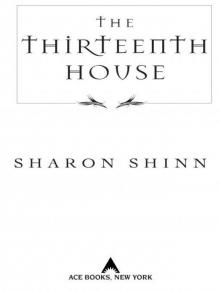 The Thirteenth House
The Thirteenth House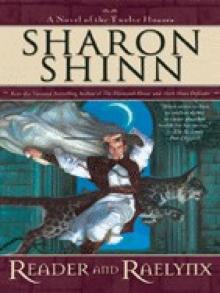 Reader and Raelynx
Reader and Raelynx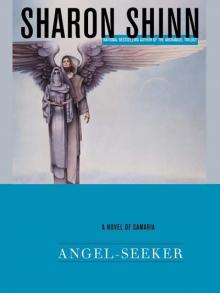 Angel-Seeker
Angel-Seeker Archangel
Archangel Jeweled Fire
Jeweled Fire Nocturne
Nocturne The Shape-Changer's Wife
The Shape-Changer's Wife Still Life With Shape-Shifter
Still Life With Shape-Shifter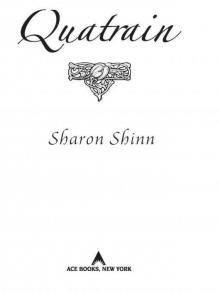 Quatrain
Quatrain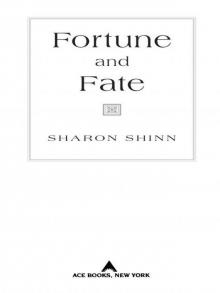 Fortune and Fate
Fortune and Fate Angelica
Angelica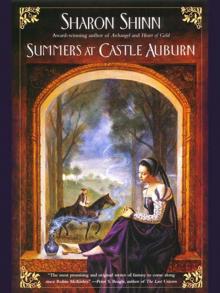 Summers at Castle Auburn
Summers at Castle Auburn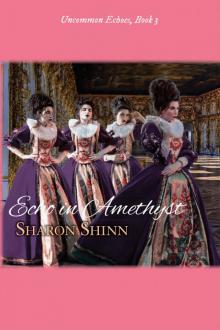 Echo in Amethyst
Echo in Amethyst The Turning Season
The Turning Season Mystic and Rider
Mystic and Rider Heart of Gold
Heart of Gold The Shape of Desire
The Shape of Desire Echo in Onyx
Echo in Onyx Royal Airs
Royal Airs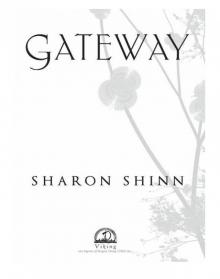 Gateway
Gateway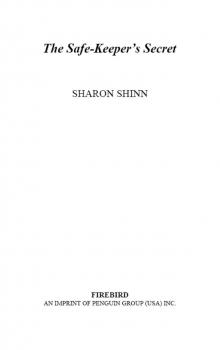 The Safe-Keeper's Secret
The Safe-Keeper's Secret Wrapt in Crystal
Wrapt in Crystal Unquiet Land
Unquiet Land Jovah's Angel
Jovah's Angel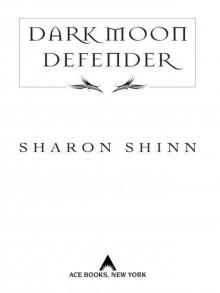 Dark Moon Defender (Twelve Houses)
Dark Moon Defender (Twelve Houses) Mystic and Rider (Twelve Houses)
Mystic and Rider (Twelve Houses)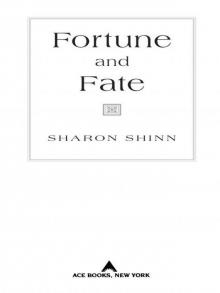 Fortune and Fate (Twelve Houses)
Fortune and Fate (Twelve Houses)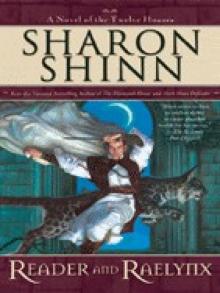 Reader and Raelynx (Twelve Houses)
Reader and Raelynx (Twelve Houses)